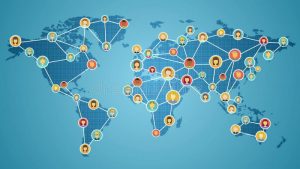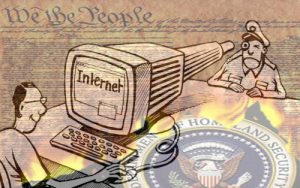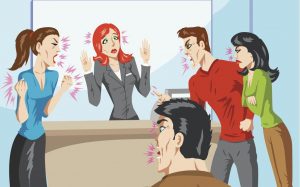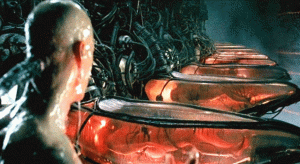Hamza Salim
Digital Technology and Culture
Final Multi-Media Essay
7/30/21
Social Media
The most significant product of digital media are the social media platforms like Facebook, Twitter, Instagram, WhatsApp, and YouTube etc. They have a huge impact on individuals, communities, and governments. They spread so fast because they seem free, and they satisfy our natural need for connection.
We are inherently social. Aristotle said “humans are social animals.” Naturally we desire connection with groups and individuals, and that is why the social media platforms are blooming everywhere. According to Digital Technology & Culture, an Open Education Resource book, the total number of active social media users worldwide is around 3.499 billio, which is almost half of the earth’s citizens. I am sure that number would be way higher if people from underdeveloped countries had better economic and political circumstances. As Rushkoff explained in his book Program or Be Programmed
In spite of its many dehumanizing tendencies, digital media is still biased toward the social. In the ongoing coevolution between people and technologies, tools that connect us thrive-and tools that don’t connect us soon learn to. We must remember that the bias of digital media is toward contact with other people, not with their content or, worse, their cash. If we don’t, we risk robbing ourselves of the main gift digital technology has to offer us in return of our having created it.
On the individual level social media has many positive sides. Through social media we can directly contact people. It also allows us to share info and thoughts without the need of the traditional gatekeepers like newspapers, magazines, radio, and TV shows. It used to be so hard to get your voice heard in public before social media. It gives regular people enough space to discuss ideas, protest against oppression, and promote and sell products or services with minimal restrictions. Online social networking is a digital phenomenon that is shaping the future.
When using social media, and individual’s identity could be a liability in many cases, so we tend to engage anonymously to avoid the consequences of what we express. As Rushkoff said, “the more anonymously we engage with others, the less we experience the human repercussions of what we say and do”. We should be ourselves, and not anonymous, unless it is necessary.
Being anonymous is a good strategy to face dictatorship or any oppressed authority, but it is not good enough. At some point, real people must stand up for their rights and show their real identity, and that will make a real impact on the ground. Real people become role models to lead the change. I remember 10 years ago when the Arab Spring started in Tunisia and spread to Egypt, Libya, and Syria, and how social media played the main role in exposing the regime’s illegal activities. Anonymous activists started posting videos on social media of the violence the security services committed against citizens. Also, anonymous groups used social media platforms to organize protesting and social events. All that organizing and exposing the oppressor by videos and live streaming was very important and courageous, but the real change started happing when people defeated their fear, and started standing up openly for what they believed in. Being themselves gave them political power; it encouraged many other people to join the peaceful protesting, and that lead to huge changes in these countries. Because of the protesting, the Egyptian dictator resigned and a free election happened for the first time in modern Egyptian history. Tunisia became the first real democracy in the Middle East. However, Syria unfortunately is still going through a civil war. The Syrians are very active online, and they have an ongoing free and open dialogue on all the sensitive topics, and that is a healthy sign and could be the basis for peace in the future.
I truly believe social media will benefit underdeveloped countries, especially in the Middle East, in the same way inventing the printing press benefitted the Europeans. Inventing the printing press gave birth to the Enlightenment era in Europe where scientists, philosophers, and free thinkers got a chance to spread knowledge to get Europe out of the Dark Ages.
Since social media arrived in the Middle East, Middle Eastern people start hearing ideas that used to be considered taboo, and whoever expressed them might put their lives on the line. Nowadays, criticizing the government system, religious beliefs, traditions, and values has become more normal. Social media gave critical thinking and the scientific method a louder voice in the Middle East, but nothing is given for free, and social media is not an exception even if it feels like it!
Social media platforms make money from the participation of the users. The more engagement that happens on a platform, the more advertising the companies can generate, and the more money they make. John Green in his YouTube video “Social Media: Crash Course Navigating Digital Information #10,” explains targeted advertising as “the advertising designed specifically for group of people who has similar interests, location, age, gender etc.”
Social media platforms use this demographic information to target individuals with advertisements, and they have a lot of information. That’s why, after Googling Toyota for my accounting class research, I start seeing Toyota commercials on the feeds of my social media accounts!
In the exchange for the service they provide; social media platforms collect information about the users from every move they do online; like what kind of videos they see and how they see it; whether they finish or not, what posts they like, what topics they comment on, what they share, what products they buy, what locations they go to, what communities they socialize with, who their friends are, and their friends of friends. It is creepy! And it raises concerns about trust, privacy, and safety.
Social media platforms are not all evil, they use some restrictions on the user’s identity to protect them from fake news and spamming. As explained in Digital Technology & Culture an Open Education Resource:
A user can block, unfriend or unfollow those they find offensive. Excessive nudity, violence, obscenity and abusive behavior can be reported. But information shared can be true or wildly untrue without a problem. If these sites were to dictate what content is appropriate and what is not, the restrictions would devalue the network as a free and open space.
At the end of the day we choose to log in and engage online.
We also understand that whatever is shared online has offline consequences, Douglas Rushkoff in his book Program or be Programmed suggested Ten Commandments for the Digital Age, and they apply to social media:
1- “Don’t be always on”. Most of our life should be spent offline. We live in real time, but digital technology does not; it is timeless and always out there ready for us to engage with it.
2- “Live in person” be aware of the place you live in. The real people around you. Do not get dislocated and lose your sense of place.
3- “You may always choose none of the above”. In Digital technology everything must be yes or no, and that forces choices on us. We have to remember that we have a third options.

4- “You are never completely right. Digital media polarizes us into opposing camps, incapable of recognizing shared values or dealing with paradox.” It oversimplifies ideas and things. The seekers of knowledge just get it with a simple research in any online search engine, skipping the learning that takes place through the traditional process of research and step by step progress to obtain information.
5- “One size does not fit all” Be aware that digital media brings everything to the same level and that puts people, ideas, and businesses at a disadvantage. For example, small businesses online are competing with chain stores, and that lowers their chance of success.
6- “Be yourself” anonymity is safer, but the more we engage through it, the less we experience the repercussions of our actions.
7- “Do not sell your friends. We must remember that the bias of digital media is toward contact with other people, not with their content or, worse, their cash.”
8- “Tell the Truth.” The more valuable, truthful, and real our messages, the more they will spread and the better we will do. We must learn to tell the truth.
9- “Share, don’t steal” openness gets abused online. By understanding the difference between sharing and stealing, we can maintain the openness of digital media.
10- “Program or be programmed” In the Digital Age we must learn how to create software and write codes, otherwise we might become the controlled by the software without noticing. Understanding programming will help with better online behavior.
Connecting for humans is essential, and people now are freer to share and access information than in any time in history. But it is not free. We exchange our personal information for the connection. Connecting online comes with risks like cyberbullying, catfishing, massive scams, disinformation campaigns, fake news, spamming, trolling, hate speech, defamation, and the Big Brother out there watching. Regardless of all that we continue to share, trade, and connect because we are human. It is critical that we stay personally involved and responsible when engaging on social media.
Notes
DIGITAL TECHNOLOGY & CULTURE An Open Education Resource
Social Media: Crash Course Navigating Digital Information #10














